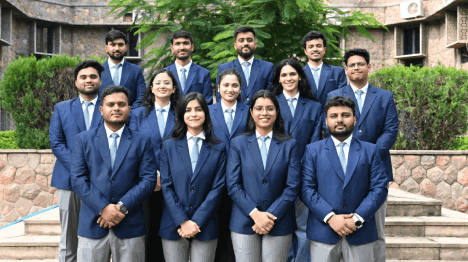- About Us
-
Academics
Schools
Programs
General Information
-
Faculty
The faculty members and researchers working at IIHMR University come from varied backgrounds including, but not limited to medicine, public health, management, economics, statistics, demography, human geography, social and behavioral sciences, rural development and pharmaceuticals.
-
Admissions
- Research
Publications & Journal
- Executive Education
Executive Programmes
- Online Certification Courses
ONLINE CERTIFICATION Courses
- Training
- Placements
- Contact
- Pradanya
- Blog
- Fee Payment
- NAAC
- IQAC
- NIRF
-
About Us
- About IIHMR University
- Board of Management
- Academic Council
- Board of Studies
- Research Board
- Institutional Review Board
- Finance & Audit Committee
- Departmental Research Committee
- Chairperson's Message
- President's Message
- IIHMR University Act
- Infrastructure
- Collaboration
- Ranking
- Board of Studies (School of Digital Health)
- Awards & Accolades
-
Academics
- Institute of Health Management Research
- School of Pharmaceutical Management
- ML Mehta School of Development Studies
- School of Digital Health
- SD Gupta School of Public Health
- MBA (Hospital and Health Management)
- MBA (Pharmaceutical Management)
- MBA (Development Management)
- MBA (Healthcare Analytics)
- Master of Public Health
- Student Manual – Cohort 9 (2021-2023)
- Master of Public Health (Offered by Johns Hopkins Bloomberg School of Public Health, USA in cooperation with IIHMR University, Jaipur, India)
- Ph. D.
- MBA CSR & ESG Management (Executive)
- MBA Sustainable Business Management (Executive)
- Common Information for all the Programs
- Academic Calendar
- Student Handbook 2020-21
- Committees
- Policies
- Annual Exam Calendar
- Library
- Faculty
- Officers of University
- Dean of Institute of Health Management Research
- Dean of School of Pharmaceutical Management
- Dean of School of Development Studies
- Dean of SD Gupta School of Public Health
- Dean of School of Digital Health
- School of Digital Health
- Faculty List A to Z
- Faculty List Designation Wise
- Faculty List School Wise
- Admissions
- Research
- Executive Education
- Training
- Placements
- Alumni
- Events
- Job Openings
- Contact
- Research
Evaluation of General Physician Based Medical Mobile Units in West Bengal
Agency : HSDI- Technical Assistance Support Team (T AST Extension), West Bengal
The Government of West Bengal has developed a comprehensive Health Sector Strategy 2004-13 (HSS), which provides a unique opportunity for the government to align its own and donor resources to meet the priorities of the state and help address the major shortcomings in both pubbc and private health provision. To enhance access of the poor to primary healthcare services and extending the reach of RCH, immunization, family welfare and clinical services to larger population and underserved areas, Gram Panchayat based Medical Mobile Units were created throughout the state. Under this program, camps were organized every week in each GP headquarters sub-centre, except those which operated from a PHC or any other health facility where regular OPD services were available. Objectives: i) to assess the programmatic inputs and processes, ii) to understand their impact on the beneficiaries in terms of increased accessibility, higher utilization of health services and lesser disease burden, iii) to understand the factors that acted for its successes or failures, iv) to identify key issues which need to be addressed to make the scheme more functional and effective. Methods: The study used both qualitative and quantitative techniques to evaluate the program. Stratified sampling was used in the study. A total of 482 respondents were interviewed from 48 GP based MMU camps held in six districts (3 poor performing districts and 3 high performing districts).
Block and district medical officers were also interviewed in this regard. The quality of MMUs was also evaluated using selected input and process indicators. Results: Most of the camps were held as per the planned schedule. Twenty-three percent of cancellation/postponement of planned camps took place in Birbhum and Murshidabad districts. 93.8% respondents said that the GP based mobile camp was the nearest facility from their house, which means that the camps had improved accessibility of the healthcare services in the state. In response to a question on the cost incurred to avail of the services nearly 62% beneficiaries said that they neither paid any penny on travel, food ete. nor did they pay for the other services at the camp. This proved the point that the mobile health camps had helped people avail of the reasonable services for free. Ninety-five percent of the beneficiaries were satisfied with the services provided by these camps. In fact, more than 75% of them had visited such camps earlier also. This itself is a very good indicator of the success of the program
Among the community members ninety- seven percent people knew about the mobile health camps held, out of which 84% knew that these camps were held on a specific day. Recommendations and Conclusions: The overall evaluation of GP based mobile health camps suggests that the camps were running successfully in terms of regular functioning, availability of drugs and basic infrastructure, healthcare services provided and satisfaction level of the patients. The issues that needed to be addressed were allocation of sufficient funds for organizing camps, shortage of doctors and proper IEC communication to the beneficiaries.



